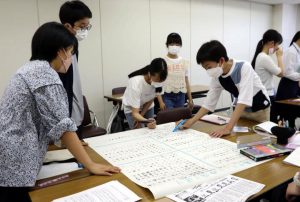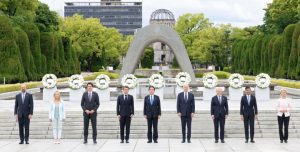Junior Writers Reporting: Junior and senior high-school students report on G7 summit, Part 2—Our views on summit’s achievements and challenges
Jun. 5, 2023
During the summit meeting of the G7 (Group of Seven industrialized nations) held in Hiroshima May 19–21, leaders from the seven nations discussed the nuclear weapons issue as well as other challenges facing the world, and released final documents such as the Hiroshima Vision, focused on the issue of nuclear disarmament, and the G7 Hiroshima Summit communique. The Chugoku Shimbun’s junior writers had a chance to reflect back on the summit based on pre-summit reporting they had done over the previous year and six recommendations to G7 leaders they worked together to develop and publish in the May 8 edition of the newspaper. Herein, we introduce the opinions and comments raised on that occasion.
The significance of hosting the summit in Hiroshima
Messages left by G7 leaders on a guestbook at the Hiroshima Peace Memorial Museum made us aware that they were able to consider the issue of peace at the museum.
It was a historic moment when the G7 leaders all together laid flowers at the Cenotaph for the A-bomb Victims. U.S. President Joe Biden also directly confronted the nuclear tragedy.
We want to hear what the leaders have to say about Ms. Ogura’s testimony of her experiences in the atomic bombing. As junior writers, our interviews with A-bomb survivors usually take more than an hour. We think the 10-minute session with Ms. Ogura was too short.
The International Media Center organized a program in which A-bomb survivors shared their atomic bombing experiences. An overseas journalist said, “It was first time for me to listen to their story. I’ll report on that experience when I return to my country.” That was wonderful.
The topic of nuclear weapons was discussed briefly at the summit, and Hiroshima’s culture was introduced to the G7 leaders. They also had a chance to try the delicious food varieties in Hiroshima. I hope many tourists visit Hiroshima and learn about the A-bombed city of Hiroshima.
Documents and declarations by leaders
Hiroshima Vision was a great achievement of the summit. It will put a brake on Russia’s use of nuclear weapons.
We wanted what the leaders experienced while they were in Hiroshima to be thoroughly incorporated into the Vision.
The Vision stressed the importance of enhancing the “transparency” of information related to nuclear weapons. We expect it will allow leaders to more easily take action.
The Vision included the idea that the actions of young people are important. With that, we hope to commit ourselves fully to our junior writer work.
The document should also have included the value of peace education at schools. If peace education is broadly incorporated into education programs around the world, we believe a world without nuclear weapons can be achieved.
Even though it might be difficult to take prompt action toward the elimination of nuclear weapons, we thought the leaders were irresponsible for not having indicated specific numerical targets for the reduction of nuclear weapons.
The fact that the summit issued statements from diverse perspectives and included environmental issues was a positive.
We were disappointed that the summit documents failed to mention anything about the Treaty on the Prohibition of Nuclear Weapons (TPNW). The documents also failed to touch on the fact that the leaders met with an A-bomb survivor. We understand the diplomatic difficulties, but the TPNW must be discussed as a topic of worldwide interest.
A world without nuclear weapons should have been defined as a goal that must be achieved by all means rather than as simply an ultimate goal.
Nuclear nations should not be satisfied merely with increasing transparency about their nuclear arsenals.
We felt that the documents justified the possession of nuclear arms by the United States, the United Kingdom, and France while at the same time criticizing China, Russia, and North Korea. We are concerned that the message from Hiroshima might have been confusing.
If the leaders had truly understood the wishes of A-bomb survivors, they would have at the very least described specific numerical targets for the reduction of nuclear weapons and general deadlines.
We were surprised that the contents of the Vision agreed with the idea of nuclear deterrence for the sake of national defense as “our security policy.” Does the word “our” include Prime Minister Fumio Kishida?
The Ukrainian president’s surprise visit to the summit
We were moved by the president’s comments indicating that Ukraine would be rebuilt like Hiroshima, a city that recovered from ruins after the atomic bombing.
If the summit were to help lead to a ceasefire in the Ukraine conflict, we felt that holding the summit in Hiroshima was meaningful.
As the United States verified that it would supply fighter jets to Ukraine, we grew concerned that the media might report that Hiroshima was complicit in the war.
We felt a special significance in the words delivered by the Ukrainian president of the nation now under threat from nuclear weapons.
Discussions should have taken place about how to halt the war immediately not about continuing the war.
What was the feedback about the summit at schools?
No one talked about the summit. I was surprised to find that many students did not know anything about the summit.
During our ethics class, we discussed impressions of the summit with our teacher.
The summit gave us an opportunity to talk about peace with our friends as part of daily conversations.
Students at schools read articles related to the summit that had been distributed to them.
Miscellaneous comments
We had a chance to learn more about the thoughts of leaders from each nation and the challenges they face.
We want to monitor how their actions will change in the future.
Instead of simply peering at the vehicle convoys of the leaders, the public should have had the chance to interact with the leaders.
South Korean President Yoon Suk Yeol and Prime Minister Kishida together laid flowers at the Monument in Memory of the Korean Victims of the A-bomb. We hope the future relationship between Japan and South Korea will be given a chance to improve.
The summit’s advocating for women’s empowerment as well as gender equality was important.
(Originally published on June 5, 2023)
The significance of hosting the summit in Hiroshima
Messages left by G7 leaders on a guestbook at the Hiroshima Peace Memorial Museum made us aware that they were able to consider the issue of peace at the museum.
It was a historic moment when the G7 leaders all together laid flowers at the Cenotaph for the A-bomb Victims. U.S. President Joe Biden also directly confronted the nuclear tragedy.
We want to hear what the leaders have to say about Ms. Ogura’s testimony of her experiences in the atomic bombing. As junior writers, our interviews with A-bomb survivors usually take more than an hour. We think the 10-minute session with Ms. Ogura was too short.
The International Media Center organized a program in which A-bomb survivors shared their atomic bombing experiences. An overseas journalist said, “It was first time for me to listen to their story. I’ll report on that experience when I return to my country.” That was wonderful.
The topic of nuclear weapons was discussed briefly at the summit, and Hiroshima’s culture was introduced to the G7 leaders. They also had a chance to try the delicious food varieties in Hiroshima. I hope many tourists visit Hiroshima and learn about the A-bombed city of Hiroshima.
Documents and declarations by leaders
Hiroshima Vision was a great achievement of the summit. It will put a brake on Russia’s use of nuclear weapons.
We wanted what the leaders experienced while they were in Hiroshima to be thoroughly incorporated into the Vision.
The Vision stressed the importance of enhancing the “transparency” of information related to nuclear weapons. We expect it will allow leaders to more easily take action.
The Vision included the idea that the actions of young people are important. With that, we hope to commit ourselves fully to our junior writer work.
The document should also have included the value of peace education at schools. If peace education is broadly incorporated into education programs around the world, we believe a world without nuclear weapons can be achieved.
Even though it might be difficult to take prompt action toward the elimination of nuclear weapons, we thought the leaders were irresponsible for not having indicated specific numerical targets for the reduction of nuclear weapons.
The fact that the summit issued statements from diverse perspectives and included environmental issues was a positive.
We were disappointed that the summit documents failed to mention anything about the Treaty on the Prohibition of Nuclear Weapons (TPNW). The documents also failed to touch on the fact that the leaders met with an A-bomb survivor. We understand the diplomatic difficulties, but the TPNW must be discussed as a topic of worldwide interest.
A world without nuclear weapons should have been defined as a goal that must be achieved by all means rather than as simply an ultimate goal.
Nuclear nations should not be satisfied merely with increasing transparency about their nuclear arsenals.
We felt that the documents justified the possession of nuclear arms by the United States, the United Kingdom, and France while at the same time criticizing China, Russia, and North Korea. We are concerned that the message from Hiroshima might have been confusing.
If the leaders had truly understood the wishes of A-bomb survivors, they would have at the very least described specific numerical targets for the reduction of nuclear weapons and general deadlines.
We were surprised that the contents of the Vision agreed with the idea of nuclear deterrence for the sake of national defense as “our security policy.” Does the word “our” include Prime Minister Fumio Kishida?
The Ukrainian president’s surprise visit to the summit
We were moved by the president’s comments indicating that Ukraine would be rebuilt like Hiroshima, a city that recovered from ruins after the atomic bombing.
If the summit were to help lead to a ceasefire in the Ukraine conflict, we felt that holding the summit in Hiroshima was meaningful.
As the United States verified that it would supply fighter jets to Ukraine, we grew concerned that the media might report that Hiroshima was complicit in the war.
We felt a special significance in the words delivered by the Ukrainian president of the nation now under threat from nuclear weapons.
Discussions should have taken place about how to halt the war immediately not about continuing the war.
What was the feedback about the summit at schools?
No one talked about the summit. I was surprised to find that many students did not know anything about the summit.
During our ethics class, we discussed impressions of the summit with our teacher.
The summit gave us an opportunity to talk about peace with our friends as part of daily conversations.
Students at schools read articles related to the summit that had been distributed to them.
Miscellaneous comments
We had a chance to learn more about the thoughts of leaders from each nation and the challenges they face.
We want to monitor how their actions will change in the future.
Instead of simply peering at the vehicle convoys of the leaders, the public should have had the chance to interact with the leaders.
South Korean President Yoon Suk Yeol and Prime Minister Kishida together laid flowers at the Monument in Memory of the Korean Victims of the A-bomb. We hope the future relationship between Japan and South Korea will be given a chance to improve.
The summit’s advocating for women’s empowerment as well as gender equality was important.
(Originally published on June 5, 2023)









